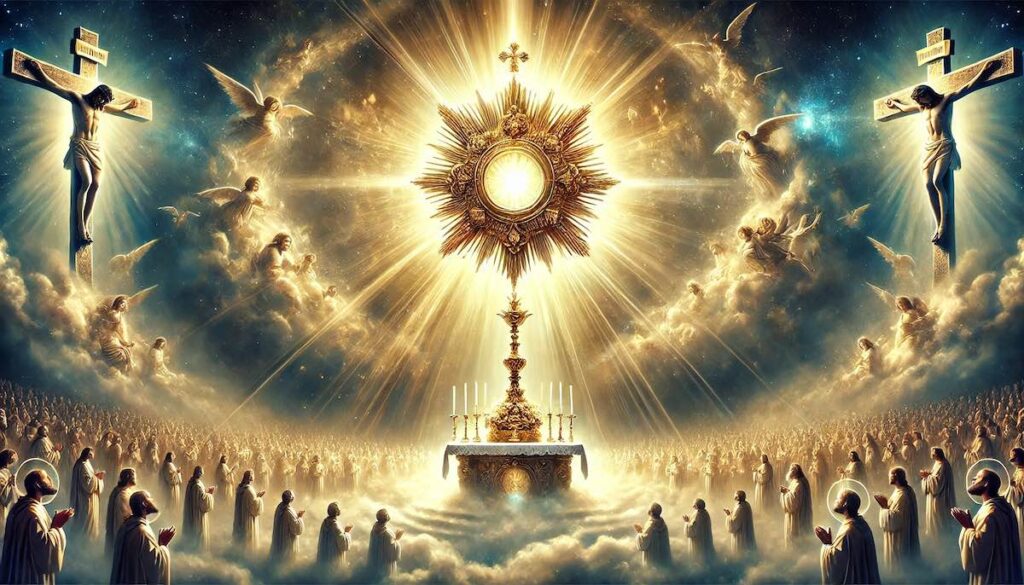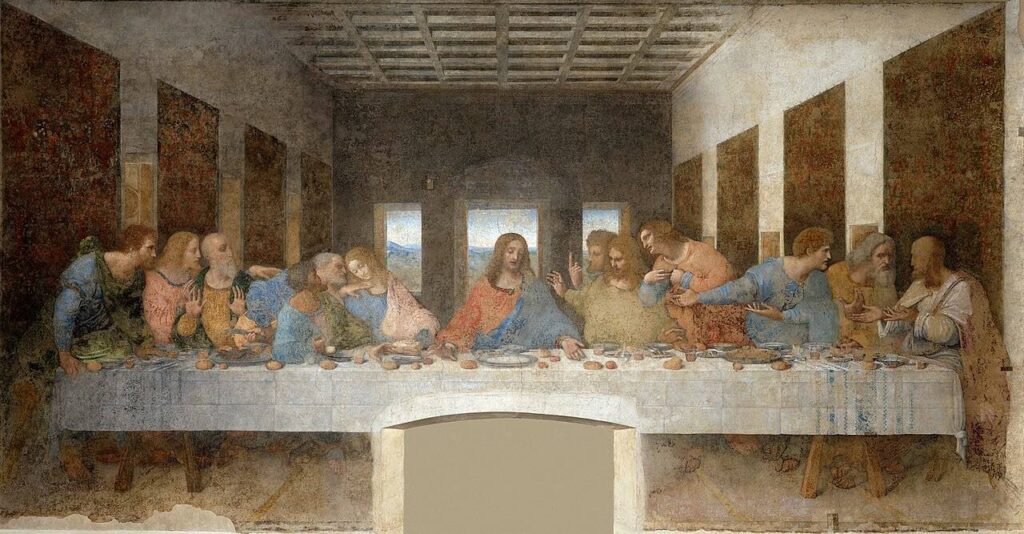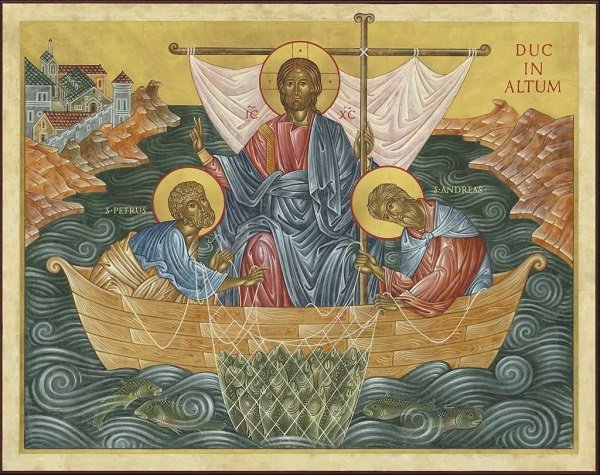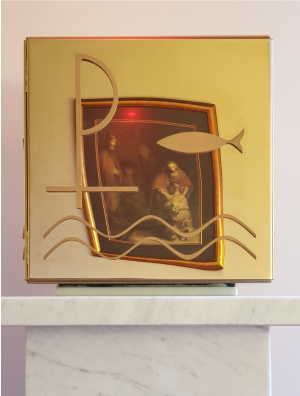In Chapter 6 of John’s Gospel, Jesus reveals a profound truth about his mission: He is the true bread from heaven, offering spiritual nourishment that transcends the material world. The people begin to recognise Jesus as the prophesied figure, greater than Moses, but they struggle to grasp the deeper significance of the bread He offers. While they fixate on the physical miracle of the loaves, Jesus points to a greater reality—His identity as the Bread of Life, which not only sustains but grants eternal life. In this reflection, we will explore the deeper meaning of Jesus as the Bread of Life through the lens of Pope Benedict XVI’s theological insight.
Jesus, the Greater Moses: The Fulfilment of Prophecy
Jesus’ declaration as the Bread of Life finds its foundation in the comparison to Moses. As Pope Benedict notes, Moses spoke to God “as a man speaks to his friend” (Ex 33:11).1 Yet, even Moses could only see God’s back—never His full glory (Ex 33:18, 22f).2 Moses mediated the covenant through the Law, which became a form of “bread” for the Jewish people, feeding them spiritually by revealing God’s will.
However, as Benedict emphasises, Jesus as the Bread of Life signifies something more profound than the manna in the wilderness or even the Torah itself. The Law shows “only God’s back,” but Jesus, being one with the Father, makes Him fully known (Jn 1:18).3 Jesus is the ultimate fulfilment of Moses’ prophecy: “I will put my words in his mouth, and he shall speak all that I command him” (Deut 18:18).4 Unlike Moses, Jesus has seen the Father, and He alone can reveal Him fully.
The Bread of Heaven: A Gift, Not an Achievement
The feeding of the five thousand, recounted in John 6, serves as the prelude to Jesus’ bread discourse. The people see the multiplication of loaves as a sign of physical sustenance, much like the manna given to their ancestors. Yet, as Benedict notes, they fail to understand that the true sign points to Jesus as the Bread of Life, the “bread which comes down from heaven, and gives life to the world” (Jn 6:33).5
Here lies a critical distinction: The bread Jesus offers is not merely for physical satisfaction, but spiritual. The people ask, “What must we do to be doing the works of God?” (Jn 6:28).6 They are ready to perform tasks to “earn” this bread. But, as Benedict asserts, this bread is a gift from God, not something that can be achieved through human effort. It mirrors Pauline theology, where grace and faith—not works—are the means by which we receive salvation. Jesus’ call is simple: believe in Him, and the bread of life will be given freely.
The Incarnation and the Cross: Bread That Transforms
The mystery of the bread discourse cannot be fully understood without reference to the Incarnation and the Passion. Jesus is not simply offering wisdom or a new law; He offers His very self. Benedict stresses this point when he states, “Jesus’ flesh is life ‘for the world’” (Jn 6:51), referring to His sacrificial death on the cross.7 The bread Jesus gives is His body, and the wine His blood, foreshadowing the Eucharist, where believers partake in His life-giving sacrifice.
This profound mystery ties the Incarnation directly to the Cross. As the Logos took on flesh, He entered our world not just to teach, but to die. This self-offering reaches its culmination in the Eucharist, where the faithful are invited to consume the “bread of life,” a participation in Christ’s redemptive act. The bread discourse, as Benedict notes, contains both the theology of the Incarnation and the theology of the Cross—inseparable aspects of Jesus’ mission.
The Law Fulfilled in Christ
In Jewish tradition, the Law (Torah) was considered a form of spiritual nourishment. As Benedict observes, it was understood as “bread from heaven,” giving life to the people by revealing God’s will. Yet, the Law, in its entirety, could only point towards a greater revelation to come. It showed God’s “back,” not His full face.
With Jesus as the Bread of Life, this limitation is transcended. Christ embodies the Law, transforming it from a set of rules into a living relationship. As Benedict writes, “The Law has become a person.” No longer is the bread of heaven something external, a guidebook to follow; rather, it is a person to whom we must cling, believe, and partake. Jesus completes what the Law could only begin.
The Sacrament of the Eucharist: Bread of Eternal Life
At the heart of Jesus’ bread discourse is the promise of eternal life. Those who eat this bread will “never hunger,” and those who believe will “never thirst” (Jn 6:35).8 This promise is realised in the Eucharist, the sacrament in which Christ gives His very body and blood for the life of the world. As Pope Benedict writes, “Earthly bread can become the bearer of Christ’s presence because it contains in itself the mystery of the Passion.”
The Eucharist brings together the entire mystery of Christ’s Incarnation and Passion. As we partake in the bread and wine, we are drawn into the Paschal mystery—where Christ’s sacrifice on the Cross and His Resurrection are made present. Benedict reminds us that the Eucharist is not simply a memorial but a transformative encounter with the living Christ. Through this sacrament, Christ’s presence nourishes us, and we are transformed, becoming “spirit” as He is spirit (Jn 6:63).9
The Grain of Wheat: Life Through Death
Jesus concludes His bread discourse with a profound metaphor: “Unless a grain of wheat falls into the earth and dies, it remains alone; but if it dies, it bears much fruit” (Jn 12:24).10 This image points to the heart of Jesus’ mission. Just as grain must die to produce life-giving bread, so too must Christ die to bring eternal life to the world.
For Pope Benedict, this image captures the full meaning of Jesus as the Bread of Life. The bread of heaven carries within it the mystery of the Passion—life through death. As Christ dies on the Cross, He becomes the source of life for all who believe. The bread we consume in the Eucharist is not only sustenance; it is the fruit of Christ’s sacrificial love, offering eternal life to those who partake in it.
The Gift of Christ’s Presence
In John 6, Jesus offers Himself as the ultimate bread, a gift of eternal life that transcends all earthly needs. He is more than the prophet foretold by Moses; He is the fulfilment of the Law, the living bread from heaven. As Pope Benedict so beautifully explains, Jesus as the Bread of Life unites the Incarnation and the Passion, bringing believers into a living relationship with the Father through the Son.
This bread, offered freely by God, cannot be earned by human efforts, nor can it be understood as mere material sustenance. It is a gift of grace, one that transforms those who receive it into participants in the divine life. As we partake in the Eucharist, we are drawn into the mystery of Christ’s sacrifice, where His death becomes our life, and His resurrection becomes our hope.
See the other chapter reviews of the first volume on Jesus of Nazareth here.

Footnotes
- Thus the Lord used to speak to Moses face to face, as a man speaks to his friend. When Moses turned again into the camp, his servant Joshua the son of Nun, a young man, did not depart from the tent. ↩︎
- 18. Moses said, “I pray thee, show me thy glory.” – 22. and while my glory passes by I will put you in a cleft of the rock, and I will cover you with my hand until I have passed by; ↩︎
- No one has ever seen God; the only Son,[a] who is in the bosom of the Father, he has made him known. ↩︎
- I will raise up for them a prophet[a] like you from among their brethren; and I will put my words in his mouth, and he shall speak to them all that I command him. ↩︎
- For the bread of God is that which comes down from heaven, and gives life to the world. ↩︎
- Then they said to him, “What must we do, to be doing the works of God? ↩︎
- I am the living bread which came down from heaven; if any one eats of this bread, he will live for ever; and the bread which I shall give for the life of the world is my flesh. ↩︎
- Jesus said to them, “I am the bread of life; he who comes to me shall not hunger, and he who believes in me shall never thirst. ↩︎
- It is the spirit that gives life, the flesh is of no avail; the words that I have spoken to you are spirit and life. ↩︎
- Truly, truly, I say to you, unless a grain of wheat falls into the earth and dies, it remains alone; but if it dies, it bears much fruit. ↩︎



